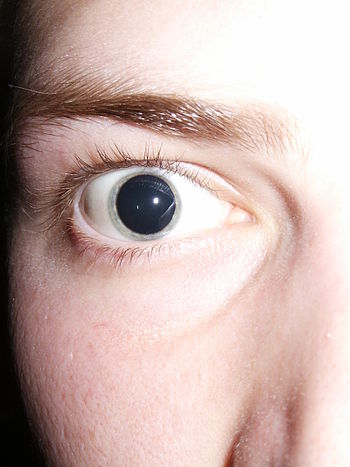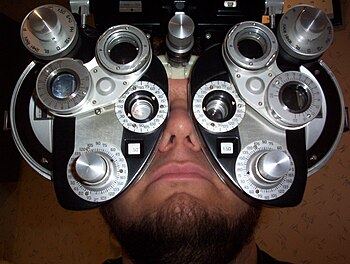 |
| English: Dilated pupils after an optometrist appointment. (Photo credit: Wikipedia) |
 |
| Conventional surgery to treat glaucoma makes a new opening in the meshwork. This new opening helps fluid to leave the eye and lowers intraocular pressure. Description: Conventional surgery to treat glaucoma makes a new opening in the meshwork. This new opening helps fluid to leave the eye and lowers intraocular pressure. Credit: National Eye Institute, National Institutes of Health Ref#: EDA11 (Photo credit: Wikipedia) |
 |
| That's the name for this thing that you look through so the optometrist can tune the settings for your eyeglass prescription. (Photo credit: Wikipedia) |
 |
| "Slit lamp examination of Eyes in an Ophthalmology Clinic" (Photo credit: Wikipedia) |
 |
| The Optometrist (Photo credit: Wikipedia) |
When it comes to eye
health it is important to know which eye care practitioners can provide you the
best care. Many of our patients may be referred to an optometrist or ophthalmologist
for follow up care after they have been in our office for minor eye injuries,
unexplained eye inflammation, or have been newly diagnosed with diabetes. In the
case diabetes the patient will be referred to have their eyes screened for
signs of glaucoma. Glaucoma is a common eye condition in patients with uncontrolled
or poorly controlled blood sugar. Some patients may be referred to an eye
specialist to determine if the headaches they experience are a result of
pressure from various eye conditions.
Many times eye doctors
both optometrist and ophthalmologist will refer patients to our practice to be
screened for high blood pressure, diabetes, or even neurological conditions.
This is because eye exams can be the place that Symtoms of many conditions
first appear.
An eye specialist many
times will consult family physicians about a patient’s eye problem if they
suspect a medication is responsible for a decline in vision. Blurred vision is
a very common side effect of many of the drugs people take for heart
conditions, arthritis pain, or even erectile dysfunction drugs. It is good as a
allied health professional to help our patients understand the difference
between optometrist and ophthalmologist.
Optometrist is the
primary care givers for our eyes. If we have ever needed glasses or contacts we
have been evaluated by an optometrist at least once. Optometrist diagnoses
complex eye conditions such as glaucoma, cataracts, and retinal issues. In some
states they even treat they these conditions. Optometrist also follow the eye health
of people with underlie health conditions that may effect their eye health such
as diabetes and hypertension.
They can prescribe
certain medications for eye conditions and provide low vision rehabilitation.
They also can remove foreign objects from the eye.
An ophthalmologist is a
medical doctor. Many are eye surgeons. They provide comprehensive service that
covers the services provided by optometrist. The difference is that those
seeking regular exams for glasses or contacts from an ophthalmologist many
times have been diagnosed with a significant eye condition not traditionally
treated by the optometrist.
Ophthalmologist treat
disease related to the cornea and conditions that effect the exterior of the
eye such as sclera, conjunctiva, and tumors. They tend to deal with any
disorder that affects the optic nerve in any way. This includes optic nerve
damage related to brain tumors, MS, or any condition causing intraocular
pressure.
Ophthalmologists are frequently
surgeons today. They do surgery ranging from common Lasik procedures to complex
retinal reattachments. They provide a range of cosmetic as well as vision
restoring procedures. Many ophthalmologists may specialize in areas related to
neurology or pediatric eye care. Some
devote their careers to the research of serious eye conditions.
Sometimes care is based
on insurance coverage and not necessarily the seriousness of the eye condition.
If you have vision insurance your first choice for any eye problems will be an
optometrist. If you have no eye coverage you may opt to see an ophthalmologist
because they are medical doctors and many times their services will be covered,
but their testing may not be. If you can afford to pay out of pocket it is best
to see an optometrist first. This is for several reasons. Costs are greatly
reduces and optometrist can treat a great deal of conditions such like glaucoma
and retinal diseases
When optometrist fined
your condition out of the scope of expertise then they will referral you to an
ophthalmologist. Eye injuries and conditions creating a sudden loss of vision
should be evaluated in the emergency room. Any follow up care will probably be
referred to an appropriate provider.




No comments:
Post a Comment